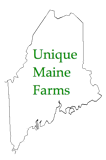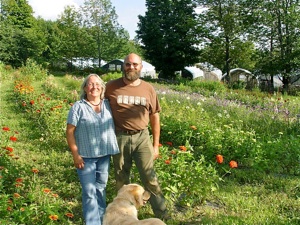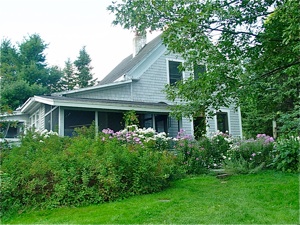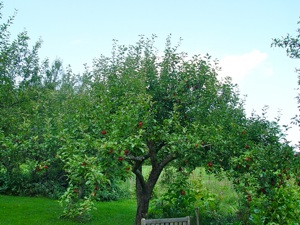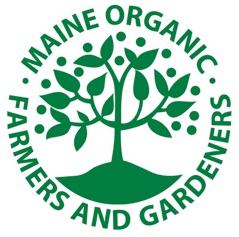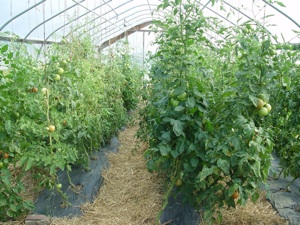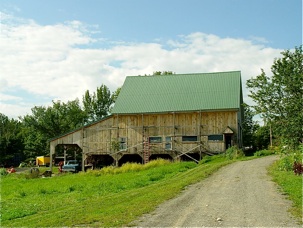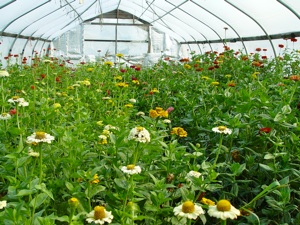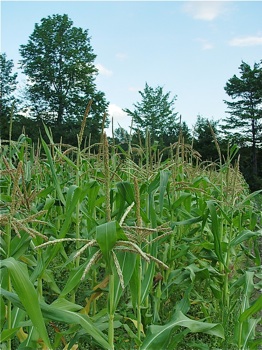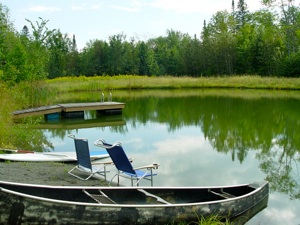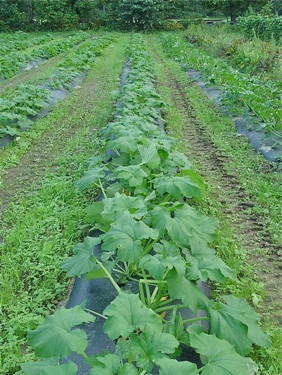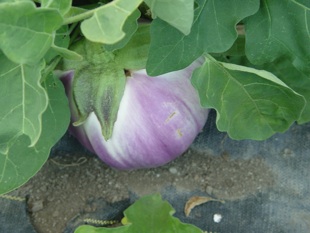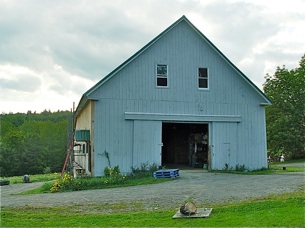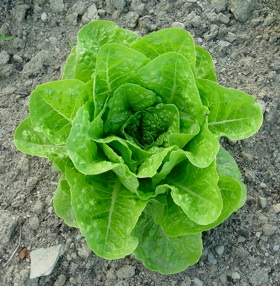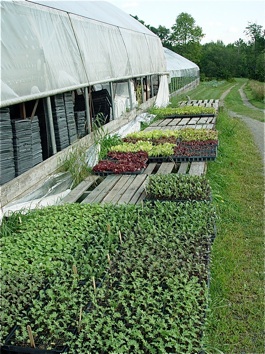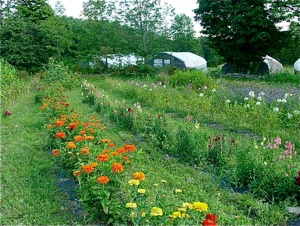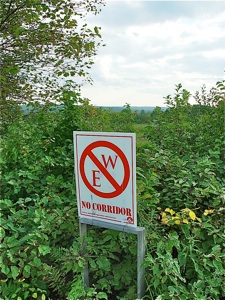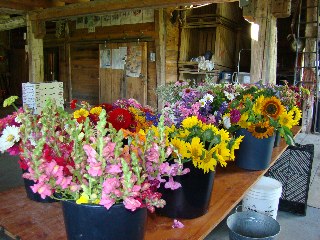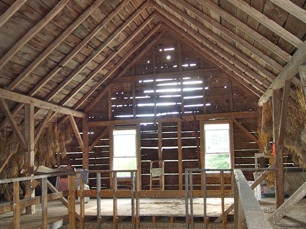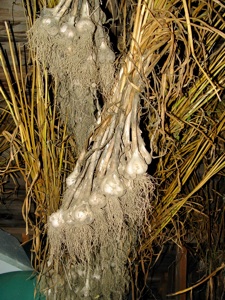Name: Checkerberry Farm
Address: Jason & Barbara Kafka
530 Wellington Road
Parkman, Maine 04443
Phone: 207-277-3114
Website:
http://www.mainehighlandsfarmers.com/Checkerberry/Checkerberry%20Farm.html
Email:
Products and Services:
-MOFGA certified organic vegetables
-cut flowers
-bedding plants and seedlings
-wholesale to distributors
-wholesale to supermarkets
-wholesale to consumer buying clubs
-herbs
What Makes Checkerberry Farm Unique?
If an individual were asked to conduct a study about the importance that the experience factor plays in correlation to the success rates in farm operations, it would be a great idea to get a hold of Jason and Barbara Kafka. They have been farming at their one-hundred acre farm in Parkman for over thirty years. Although there certainly have been some bumps along the road in their farm journey, it sure seems that they have developed a solid, successful, and manageable organic farm operation that could serve as a great model for other farms.
When the Kafkas purchased their farm in 1981, it was in need of a great deal of work. Jason described the land as being “in a state of benign neglect.” He worked driving a fuel truck in the local area for several years and Barbara has been employed as an elementary school teacher. They raised their daughter, Emma, on their farm. Neither Jason nor Barbara hailed from farming backgrounds. Jason earned his Bachelor of Science in behavioral science, which may account for his uncanny ability to analyze and skillfully communicate his thoughts about farming practices and trends.
Barbara and Jason knew they needed to come up with a name for their farm, and they explained that they wanted to choose something that was “non-generic, unique, and memorable.” They said that they wanted it to be something that would “roll off the tongue well and something we wouldn’t regret later.” Checkerberries were growing in part of their property in land that they did not farm, so the name of Checkerberry Farm was chosen. The name and the farm have persevered. There is a rich history surrounding checkerberries in regard to Native American tribes who used the berries for many medicinal purposes. Another interesting parallel to note is how checkerberries have been a source of food for a whole variety of species of wildlife on their property, just as the Kafka’s farm has been a food source for many people since they established their farm.
In their early homesteading days, Jason and Barbara raised a variety of animals for about six years. They started with French Alpine goats. The first was a wedding gift, Laura, who was named after the sister-in-law, who gave it to them. They established a herd that grew to around a dozen goats. Both soft and hard cheese were made from the goats’ milk. They also raised Hereford beef cattle and sold the meat. Other animals raised at the farm in the early days included rabbits, pigs, Muscovy ducks, laying hens, chickens, and turkeys. There was a Shetland pony named “Nuisance” who lived at their farm for many years. At the present time, the only domestic animal residing at the farm is Maddie, their Golden-Labradoodle.
From the start, Jason and Barbara had been committed to organic methods. Back in the early days, their approach to controlling pests, their choice of crops, passion for building the soil, and avoidance of toxic sprays were often viewed with skepticism. Jason chuckled when he reminisced about all the friendly teasing and how he and Barbara’s passion for organic farming was often the brunt of many jokes.
Mort Mather, one of the founding members of the Maine Organic Farmers and Gardeners Association and the Program Coordinator for the Farms for the Future program, shared that “Jason and Barbara were in the first round of Farms for the Future and a perfect example of how the program could work to make farms more profitable.” He said, “The grant program was two parts: the first grant was assistance from a team put together to help the farmer develop a business plan for an idea he/she had to improve their bottom line; the second grant was cash to help develop the plan.”
Mather continued explaining that, “Most, if not all farmers, applied to Farms for the Future with the hope of getting the cash grant and figuring they would put up with the team if they had to. Jason was no different, but I will long remember the meeting of the team in his house when the plan was completed and he was able to look at the actual financial advantage he would realize. The look on his face was like a kid Christmas morning. He got the cash grant, followed the business plan and has been forever grateful.”
As the years went by, the quality and quantity of organic vegetables that the Kafkas were able to grow began to receive quite a bit of attention. There are only about one hundred frost-free days in the zone in Piscataquis County where Checkerberry Farm is located. A production greenhouse and several high tunnels were added to the farm to increase the length of the growing season. There are over 10,000 square feet of crops now growing at Checkerberry Farm under plastic in seven structures. Twenty acres of fields with over fifty varieties of crops including many vegetables, herbs, seedlings, edible flowers, cut flowers, fruits, and cover crops are grown. Over seventy-five acres of woods at Checkerberry Farm are managed for the harvesting of firewood, sawlogs, and pulp.
Barbara Kafka specializes in growing flowers
and is well-known for the “farmhouse bouquets” that she creates from a variety of flowers that she raises including zinnias, statice, snapdragons, sunflowers, cleome, celosias, bells of Ireland, verbena bonariensis, yarrows, echinacea, ox-eyed daisies, lavatera, tri-colored salvia, cosmos, sweet Annie, wormwood, broom corn, kiss-me-over-the-garden-gate, globe amaranth, and whatever presents itself that has length and relative longevity as a cut flower. Barbara was kind enough to share several photos of some of her flowers. They are sold to Whole Foods Market and to private parties. The grounds at the farm are beautifully landscaped and when visitors pull into the entrance of the farm during the summer there is a view of a welcoming country farmhouse surrounded with an assortment of beautiful flowers.
Often creativity and resourcefulness comes into play at Checkerberry Farm. Their sauna provides a source or relaxation, but it also serves as a drying space for tomatoes. Very innovative and mechanically-inclined, Jason expanded their selection of farm equipment and experimented with innovative cultivators and methods. He has designed and built several farm tools and devices. Recycling old pieces of equipment for future projects is standard practice. When Winkie, (the name fondly applied to their dilapidated barn), was just about ready to collapse, it was given an overhaul thanks to Jason’s skills and assistance from the Farms for the Future program. A great deal of time and effort also went into the renovation of their farmhouse.
After nine years, the Kafkas settled into growing vegetables on a large scale and they reached the point where they had sufficient produce to sell at markets. In the early days the Kafkas traveled to farmers markets in Orono, Greenville, Brewer, and Dover-Foxcroft. For over twenty years they ran a booth at the Common Ground Country Fair.
For the past several years, Checkerberry Farm has focused on selling on a wholesale basis exclusively to distributors, buying clubs, and supermarkets. Their wholesale customers include Whole Foods Market, Fedco Seeds, Crown O’ Maine Organic Cooperative, Wolf Pine Farm, Stutzman’s Farm Stand, Farm Fresh Connection, and Wood Prairie Farm. Instead of running a booth at the Common Ground Country Fair as they did for so many years, they now sell their produce on a wholesale basis to several vendors at the fair.
Barbara Gulino, the Marketing Team Leader at Whole Foods Market in Portland stated that Barbara and Jason are “lovely people who I have had the pleasure of knowing over the years. We have been open now for seven years and Checkerberry Farm has been with us since the beginning.” She commented, “Good people, good produce, happy to be working with them.”
Jim Gerritsen of Wood Prairie Farm commented, “For many years we have bought certified organic plant starts from Jason and Barbara which we then plant on our farm. In the spring we are pressed to the max shipping seed potatoes and they are life savers to us. They are to onions, what we are to potatoes. They are quality people who produce quality produce and onions are one of their specialties. It’s also nice that they get their seed potatoes from us.”
At the 2005, 2009, and 2013, New England Vegetable and Fruit Conferences in Manchester, New Hampshire, Jason shared some hints about growing onions. In his talks he explained that the ground needs to be in “tip-top” shape with a minimum three-year rotation for any allium. He recommended that a cover crop of a legume/grass be planted in the prior year and that large quantities of organic matter be added to the soil. At Checkerberry Farm, seed is started in mid-February in the production greenhouse and the seedlings are moved into high tunnels, and subsequently, outside as soon as possible. The cultivation is accomplished first with a “blind” tine weeder and then a switch to sweeps and side knives takes place. A powered cultivator is used if the weeds become too numerous. The onion plants are irrigated from above each week. With the emergence of any pests, such as thrips, an Entrust spray is used. After the onions are pulled and cured, they need to be topped and stored. Jason emphasized the benefit of a topping table and cold, dry storage in the growing of onions.
Underneath Jason’s laid-back and entertaining manner, is a farmer who is quite methodical in his approach to growing crops. His gigantic Alisa Craig onions and Gigante kohlrabi that tip the scales contributed to his reputation as a very successful grower. He grows two to three tons of celeriac. He has become adept at precise calculations of the number of seeds, size of the rows, the optimum spacing of plants and necessary growing conditions. As with any successful farmer, he has realized that farming is a business.
Jason seems at peace with the path that he and Barbara have followed in raising their family and establishing their farm. He is not concerned about promoting the farm, but he is happy to share what he has learned with others. He is often invited to speak at conferences and various gatherings. In 2004, Jason was invited to deliver the Keynote Address at the Common Ground Fair.
Often at many farms there is a somewhat of a frenzied atmosphere with all the overwhelming tasks that must be accomplished. At Checkerberry Farm there was a distinct sense of calm. Jason explained that he hires mostly adults to help out on the farm and he attempts to compensate them fairly on an hourly basis. He and Barbara wish to see that the workers become vested in the farm.
The Kafka’s barn was exceptionally organized with a well-stocked supply of various boxes and packaging materials for the wholesale orders. The weekly schedule has evolved to the point that Saturday and Sunday correlates to some time for relaxation. There is pond with a canoe and a sauna right on the property. Many picnic dinners have been enjoyed at the pond. The wholesale accounts have resulted in a much more efficient use of time in comparison to all the miles that were clocked traveling to all the farmers’ markets and all the setting up and breaking down of the booths.
Being able to succeed in farming for over thirty years, without having come from a farming background, is quite remarkable. The Kafkas have learned to diversify. They have been willing to experiment with various methods and change their focus from retail sales to wholesale markets. When asked if there was any advice for young farmers, the response was “Persevere and it happens.” Their track record in organic farming has certainly given a great deal of validity to their words of advice.


